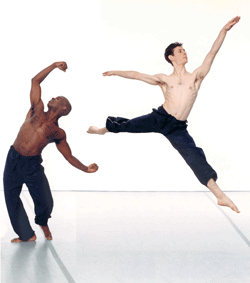Julie Strandberg, the founder and director of Brown’s dance program, admits that the liberal arts “is not the typical path” to a dance career. Still, two of modern dance’s indisputable stars—Joe Bowie ’86 and David Leventhal ’95, of the acclaimed Mark Morris Dance Group—started out studying literature. The two have spent the past year touring the world as part of the company’s twenty-fifth anniversary celebration.

Although
Bowie and Leventhal took nearly identical career paths after college,
they came to dance by different routes. Bowie, who at forty-two is one
of the company’s oldest members, grew up in Lansing, Michigan, where as
a child he loved to dance around the house but never took a formal
lesson. As a student at Brown, he took a dance class on a dare from a
friend. “I immediately fell in love with it,” Bowie says. Not only
that, he was good at it. “He never made the same mistake twice,” says
Strandberg. “He just kept getting better and better.”
The hard part was telling his parents. “My mother
told me that it was a phase that had to end,” Bowie recalls. “I had
never gone against my parents’ wishes before. This was the first
decision I made for myself.” The decision paid off. Just eight months
after graduation, Bowie landed a spot in the Paul Taylor Dance Company,
and two years later, in 1989, he joined up with Morris. Before long,
Bowie’s parents came around, too. “I remember the first time my mother
saw me dance,” he says. “Afterwards she just kept shaking me and
saying, ‘You were really good!’ ”
Unlike Bowie, Leventhal, who grew up in Newton, Massachusetts, had studied off and on at the Boston Ballet since age eight and had the support of his arts-enthusiast parents. But he had a different challenge to overcome: his own skepticism about modern dance. “There was this unspoken bias in ballet schools that modern dance is for people who don’t have the body or technique for ballet,” Leventhal says. “What I soon discovered is that modern is its own separate and equal entity with its own technique and artistic integrity.”
After graduation Leventhal gave himself three years to make it as a dancer. He made it in two. In 1997 Morris hired him as an understudy, and in 1998 Leventhal joined the group full time, finding comfort in the presence of another Brown alumnus in the group. “It was intimidating entering a field where so many people had rigorous conservatory training,” says Leventhal, now thirty-three. “I thought, ‘Who am I? I’m just an English major from Brown who danced on the side.’ It was comforting to know that Joe had come from the same place and was succeeding.”
Their boss, Mark Morris, has his own thoughts about higher ed, however. Last year, the outspoken choreographer told the New York Times that dancers should forego college, which, he said, “is just a big bag of wind.”
At least two of his dancers respectfully disagree. “I’m so happy that I had a liberal arts experience that had dance in it,” Leventhal says. “If I hadn’t gone to Brown,” Bowie adds, “I wouldn’t be dancing right now.”
Michelle Walson is studying film production at NYU. Mark Morris Dance Company will perform at University of California, Berkeley, September 30–October 7; the Quick Center for the Performing Arts in Fairfield, Connecticut, October 22; and Halle E, Museums Quartier in Vienna, December 7–10.





